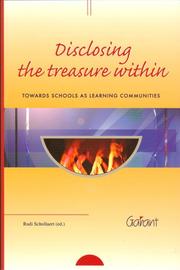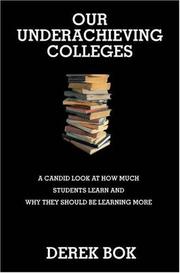| Listing 1 - 4 of 4 |
Sort by
|
Book
ISBN: 9781119268505 Year: 2016 Publisher: San Francisco Jossey-Bass
Abstract | Keywords | Export | Availability | Bookmark
 Loading...
Loading...Choose an application
- Reference Manager
- EndNote
- RefWorks (Direct export to RefWorks)

ISBN: 9044114875 Year: 2003 Volume: 9 Publisher: Antwerpen Apeldoorn Garant
Abstract | Keywords | Export | Availability | Bookmark
 Loading...
Loading...Choose an application
- Reference Manager
- EndNote
- RefWorks (Direct export to RefWorks)
1-1487-5
Lerarenopleiding --- algemeen. --- Onderwijskwaliteit --- Onderwijsmanagement --- 450.4

ISBN: 0691125961 9780691125961 0691136181 1400826985 1400831334 9780691136189 Year: 2006 Publisher: Princeton: Princeton university press,
Abstract | Keywords | Export | Availability | Bookmark
 Loading...
Loading...Choose an application
- Reference Manager
- EndNote
- RefWorks (Direct export to RefWorks)
Drawing on a large body of empirical evidence, former Harvard President Derek Bok examines how much progress college students actually make toward widely accepted goals of undergraduate education. His conclusions are sobering. Although most students make gains in many important respects, they improve much less than they should in such important areas as writing, critical thinking, quantitative skills, and moral reasoning. Large majorities of college seniors do not feel that they have made substantial progress in speaking a foreign language, acquiring cultural and aesthetic interests, or learning what they need to know to become active and informed citizens. Overall, despite their vastly increased resources, more powerful technology, and hundreds of new courses, colleges cannot be confident that students are learning more than they did fifty years ago. Looking further, Bok finds that many important college courses are left to the least experienced teachers and that most professors continue to teach in ways that have proven to be less effective than other available methods. In reviewing their educational programs, however, faculties typically ignore this evidence. Instead, they spend most of their time discussing what courses to require, although the lasting impact of college will almost certainly depend much more on how the courses are taught. In his final chapter, Bok describes the changes that faculties and academic leaders can make to help students accomplish more. Without ignoring the contributions that America's colleges have made, Bok delivers a powerful critique - one that educators will ignore at their peril.
HO (hoger onderwijs) --- leergedrag --- onderwijsonderzoek --- leerdoelstellingen --- Research on teaching --- Higher education --- onderwijskwaliteit --- United States --- Academic achievement --- Education, Higher --- Aims and objectives --- United States of America
Book
ISBN: 9780367565527 9780367565534 9781003098331 1003098339 9781000410693 1000410692 9781000410662 1000410668 0367565528 0367565536 Year: 2022 Publisher: New York Routledge
Abstract | Keywords | Export | Availability | Bookmark
 Loading...
Loading...Choose an application
- Reference Manager
- EndNote
- RefWorks (Direct export to RefWorks)
This book makes an intervention in a long-standing discussion by arguing that education should be world-centred rather than child-centred or curriculum-centred. This is not just because education should provide students with the knowledge and skills to act effectively in the world, but is first and foremost because the world is the place where our existence as human beings takes place.In the seven chapters in this book Gert Biesta explores in detail what an existential orientation to education entails and why this should be an urgent concern for education today. He highlights the importance of teaching, not understood as the transmission of knowledge and skills but as an act of (re)directing the attention of students to the world, so that they may encounter what the world is asking from them. The book thus shows why teaching matters for education. It also highlights the unique position of the school as the place where the new generation is given the time to meet the world and meet themselves in relation to the world. The extent to which society is still willing to make this time available, is an important indicator of its democratic quality.This important text demonstrates, not only to academics, but also to students, teachers, school administrators, and teacher educators, the urgency of a world-centred orientation for education today.Bron: flaptekst
Educación humanística. --- Educación internaciomnal. --- Educación --- Education --- Education, Humanistic. --- International Education. --- Fines y objetivos. --- Aims and objectives. --- Educational sciences --- Internationale educatie --- Education, Liberal --- Humanistic education --- Liberal arts education --- Liberal education --- Classical education --- Aims and objectives of education --- Educational aims and objectives --- Educational goals --- Educational objectives --- Educational purposes --- Goals, Educational --- Instructional objectives --- Objectives, Educational --- Purposes, Educational --- Educational sociology --- Teaching --- ontwikkelingsgericht onderwijs --- onderwijskwaliteit --- onderwijsbeleid --- Onderwijs --- Maatschappij --- Wereldburgerschap --- Opvoeding --- Pedagogie --- Education, Humanistic --- Aims and objectives
| Listing 1 - 4 of 4 |
Sort by
|

 Search
Search Feedback
Feedback About UniCat
About UniCat  Help
Help News
News